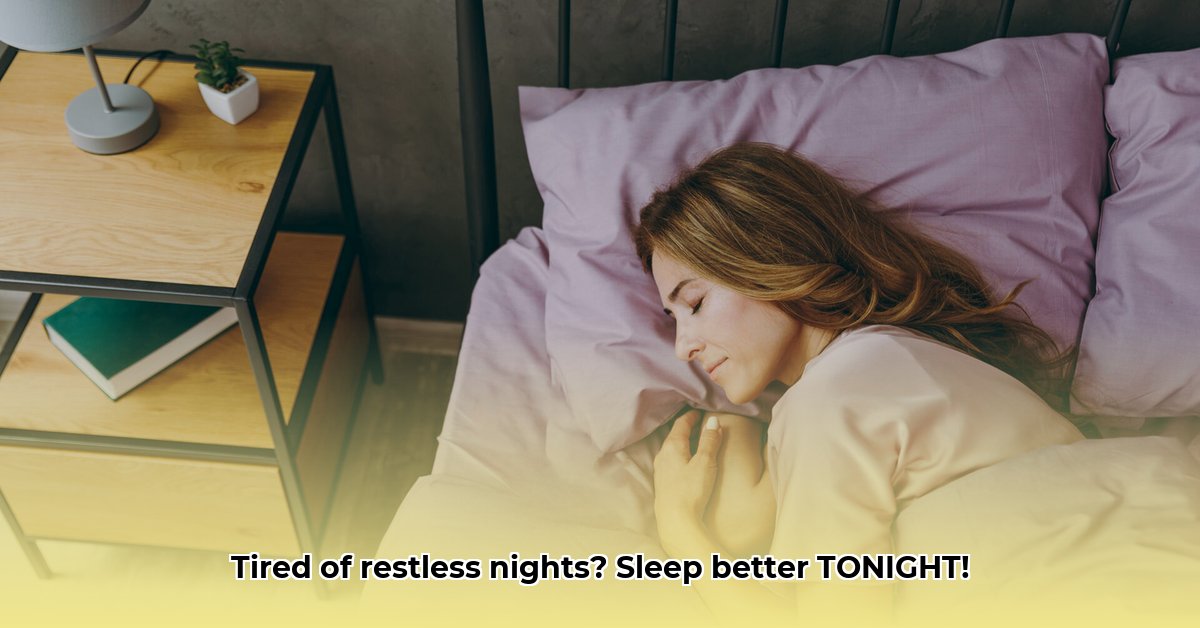
Understanding Your Sleep Cycle: The Key to Restful Nights
Is that tired feeling hanging around even after a full night's sleep? Many South Africans find themselves battling to achieve truly restorative sleep. But what if you could unlock that deep, rejuvenating sleep that leaves you feeling refreshed and ready to conquer the day? The secret lies in understanding your sleep cycles and making a few smart lifestyle changes. Let's explore how to sleep your way to a brighter, more energetic tomorrow.
Deep sleep, that crucial phase where your body repairs and restores, is often overlooked. Insufficient deep sleep leaves you sluggish and groggy, even if you’ve spent hours in bed. It’s like your body hasn't properly rebooted. Did you know that we cycle through different sleep stages throughout the night, and the amount of deep sleep directly impacts our overall well-being?
Optimize Your Sleep Hygiene: Small Changes, Big Impact
Improving your sleep hygiene is the first step to achieving true rest. Think of it as building the foundation for a good night's sleep. Here's how:
Consistent Sleep Schedule: Aim to go to bed and wake up at roughly the same times each day, including weekends. This helps regulate your body's natural sleep rhythm. Your body will thank you for it!
Your Sleep Sanctuary: Ensure your bedroom is dark, quiet, and cool. A dark, quiet and cool bedroom promotes relaxation and quicker sleep onset. Consider blackout curtains or earplugs for a deeper sleep.
Block Out Blue Light: Reduce exposure to blue light from screens an hour before bed. This blue light interferes with melatonin production (the hormone that regulates your sleep-wake cycle). Try putting your phone, tablet, and computer away a while before bedtime.
A Relaxing Routine: Establish a calming pre-sleep ritual – a warm bath, some light reading, or gentle stretching exercises can help prepare your body for sleep. Get ready for dreamland!
Exploring Sleep Supplements: A Cautious Approach
While lifestyle changes are paramount, some individuals may find additional assistance from sleep supplements. However, always consult a healthcare professional before using any new supplements, especially if you have pre-existing medical conditions.
Here are a few commonly used options:
| Supplement | Potential Benefits | Considerations |
|---|---|---|
| GABA | Promotes relaxation and reduces anxiety. | May interact with medications; start with a low dose. |
| L-Theanine | Calming effect; improves sleep quality. | Generally well-tolerated; may cause mild drowsiness. |
| Magnesium | Muscle relaxation; improves sleep onset. | Can have a laxative effect; choose a suitable form. |
| Melatonin | Regulates sleep-wake cycle; aids sleep onset. | May cause daytime drowsiness; use cautiously. |
Remember, supplements are not a quick fix and should complement good sleep habits.
Long-Term Strategies for Sustainable Sleep Improvement
For lasting sleep improvement, address underlying issues affecting your sleep.
Stress Management: Practice relaxation techniques like yoga or meditation. Stress is a major sleep disruptor. Are you finding it difficult to unwind before bed? Consider incorporating mindfulness techniques.
Regular Exercise: Moderate exercise improves sleep, but avoid intense workouts close to bedtime. Studies show regular physical activity significantly enhances sleep quality. Do you incorporate enough movement into your daily routine?
Dietary Adjustments: Limit caffeine and alcohol intake, especially in the evening. These substances can interfere with your sleep patterns. A balanced diet is also essential for overall wellbeing, including sleep. Could your diet be hindering your rest?
“In Diepe Slaap Liggen” is a journey, not a sprint. Be patient with yourself, and don't hesitate to seek professional help if needed. A good night's rest is an investment in your health and well-being, so make it a priority! Isn't getting quality sleep worth the effort?
How to Improve Deep Sleep Using Specific Supplements and Lifestyle Changes
Three Pivotal Points from Research:
- Melatonin shows promise for sleep improvement, though optimal dosage remains unclear.
- Magnesium and zinc may be beneficial, particularly if deficiency is present. Further research needed.
- Lifestyle improvements are often just as, if not more, effective than supplements.
Dr. Sarah Matthews, Sleep Specialist at the University of Stellenbosch, emphasizes the importance of proper sleep hygiene: "Often, simple changes to your bedtime routine and sleep environment can make a world of difference." She further stresses that supplements should always be used under the guidance of a doctor.